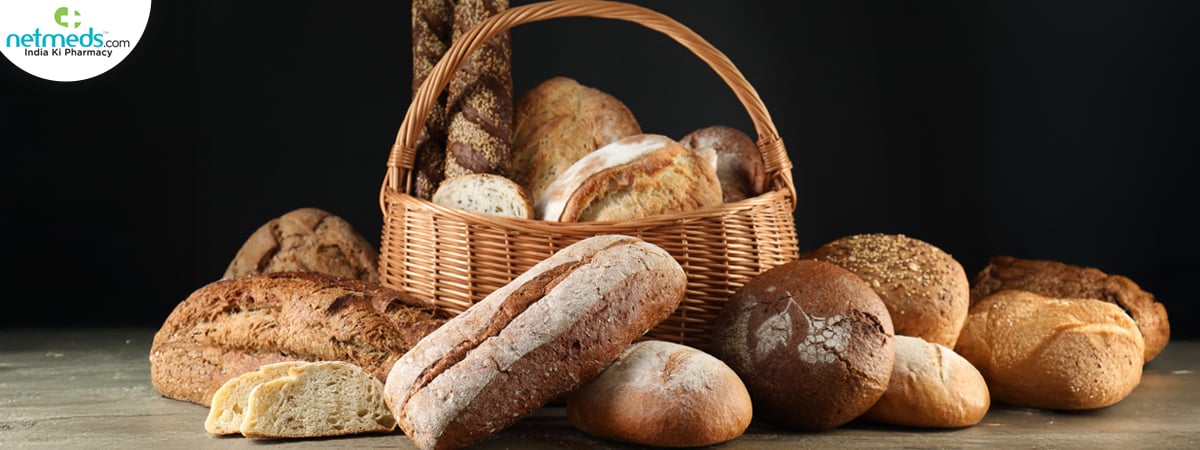Bread is a staple food across global cuisines, and more than a dozen varieties are available in stores. Each one comes with its own characteristic taste, texture, nutritional profile, and health benefits. Whether you are choosing bread for making toast, sandwiches, weight loss, improving gut health, or a wholesome meal, understanding the differences helps you pick the right one based on your goals. Certain types of bread are loaded with fiber, vitamins and minerals, while others are made from refined grains and lack vital nutrients. So, you may wonder which type of bread is healthiest. Then this article is for you, take this two-minute read to learn more about popular types of bread, their nutrition, health benefits and best ways to use them.

Buy Our Best-Selling Nutrition Supplements Today, To Uplift The Health Of Yourself And Your Family!
Different Types of Bread
Whole Wheat Bread
Whole wheat bread is made from wheat encompassing all three parts of the grain: bran, germ, and endosperm, which makes it nutritionally superior.
Health Benefits
The richness of dietary fiber regularises bowel movements and prevents constipation.
The presence of complex carbohydrates and fiber slows down glucose absorption and prevents blood sugar spikes.
Slow-digesting carbs fuel your body throughout the day and keep you active and energised.
Also Read: Homemade Bread Recipes: Fresh Tasty Loaves Packed With Good Health And Nutrition
Rich in iron, folate, magnesium, B vitamins and dietary fiber that keeps you satiated and reduces unwanted hunger pangs.
Uses
Sandwiches
Toast
Healthy breakfast combos
Lunch wraps
Multigrain Bread
Multigrain bread is made out of a blend of grains like oats, millets, barley, flax, quinoa, and wheat.
Health Benefits
Loaded with omega-3 fatty acids, phytonutrients, and soluble fiber, it helps to reduce cholesterol levels and improve heart health.
Rich in vital vitamins and minerals boosts immunity and supports cell function.
High fiber promotes digestion and prevents overeating.
The presence of complex starch and fiber slows absorption, preventing spikes and crashes.
Boost energy levels, and it is a great option for athletes.
Uses
Power-packed breakfast toast
Wholesome sandwiches
Fitness meals
Sourdough Bread
Sourdough is made using a natural fermentation process, which is a tedious process and makes the bread soft, tastier and wholesome. This process offers a unique tangy taste and is power-packed with nutrition.
The fermentation process produces beneficial gut bacteria (probiotics) and augments overall gut function and digestive health
The fermentation process breaks down gluten partially and makes it easier to digest.
Low in glycaemic index, it helps manage blood sugar levels.
Phytic acid content is reduced during the fermentation process, which improves better assimilation of nutrients and mineral uptake.
Fermentation increases antioxidant content and strengthens the immune system.
Uses
Make a gourmet sandwich
Toast with butter, cheese, avocado or protein.
Bread bowls
Oat Bread
Oat bread is made by combining oats with whole wheat flour. The dense profile of beta-glucan fiber found in oats naturally reduces cholesterol levels and enhances heart health. Moreover, potent anti-inflammatory effects ease inflammation and lower blood pressure.
The dietary fiber and complex carbs slow down gastric emptying time and prevent blood sugar surges.
This bread is a perfect choice for weight loss meals, as it keeps you satiated and prevents unwanted snacking.
Soluble fiber promotes healthy gut flora and prevents digestive issues.
Also Read: Got Leftover Bread? Try These Easy, Unique, Delicious Recipes
Uses
Light sandwiches
Breakfast toasts with fruit or nut butter
Gluten-Free Bread
This type of bread is made with rice, almond, sorghum, tapioca, or millet flour.
As it is totally gluten-free, it is the right choice for celiac patients and those with gluten intolerance.
Suitable for people with IBS or wheat intolerance.
Beneficial for autoimmune or inflammatory disorders.
When made from almond or sorghum flour, it adds protein and minerals.
Uses
Sandwiches
Toast
Snacks for gluten-free diets
Pita Bread
Pita bread is soft, pocket-style bread popular in Mediterranean cuisine. It is made from whole wheat flour and is low in calories. Thin texture and easy to fill with healthy ingredients make it a good option for portion control.
Whole wheat pita adds fiber content and promotes digestion. Additionally, it also provides iron, B vitamins, and carbs for energy.
Uses
Wraps
Stuffed pockets
Middle Eastern dishes
Flatbread (Naan, Roti, Tortilla)
Flatbreads are made from flour, water, salt and very minimal quantities of additives. It varies by culture but is typically simple and versatile.
Whole grain options such as whole wheat rotis and tortillas boost energy intake and fiber content.
Provides sustained release of energy and is ideal for fitness enthusiasts and active individuals.
Multigrain or millet-based versions add minerals and antioxidant content.
Uses
Indian meals
Mexican dishes (tacos or quesadillas)
Wraps and rolls
How to Choose the Healthiest Bread?
Always look for whole grain or 100% whole wheat products, which are rich in fibre that supports digestion and overall health.
Look for low sugar content, less than 2g per slice, and 2-4g of fiber per slice. Devoid of preservatives, artificial colours, or additives.
Opt for multigrain, high-protein options, which are ideal for fitness and weight management.
References
Evaluation of nutrients in bread: a systematic review
Zahra Aghalari 1,✉, Hans-Uwe Dahms 2,3,7, Mika Sillanpää
https://pmc.ncbi.nlm.nih.gov/articles/PMC9664613/
Comparison of different bread types: Chemical and physical parameters
Author links open overlay panelMárcio Carocho a, Patricia Morales b,
María Ciudad-Mulero b
, Virginia Fernández-Ruiz b,
Elisabete Ferreira c
, Sandrina Heleno a, Paula Rodrigues a, Lillian Barros a, Isabel C.F.R. Ferreira a
https://www.sciencedirect.com/science/article/abs/pii/S0308814619320941



 Previous
Previous